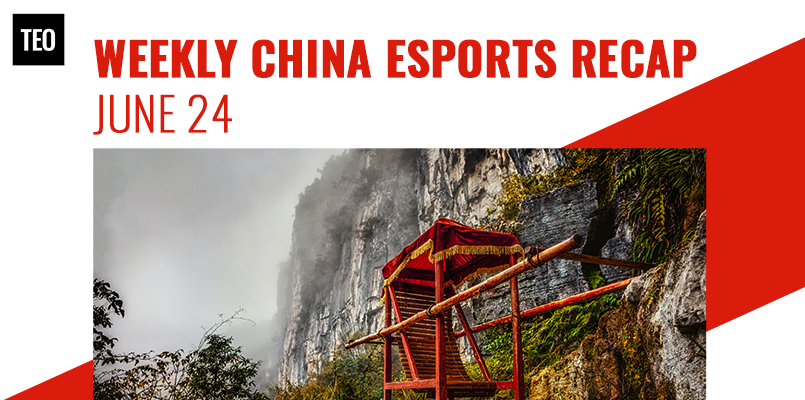The second wave of COVID-19 outbreaks continues to grow in China. Since the new outbreak started on June 11, Beijing has confirmed 256 COVID-19 cases at the time of writing. Five districts of Beijing increased its “COVID-19 risk” level from medium to high.
This is rapidly influencing the economic recovery of China’s entertainment industry, including esports. On June 22, the Ministry of Culture and Tourism of China announced that customers can not spend more than two hours in entertainment venues, including internet bars—the main grassroots space for esports.
Among the top stories in China’s esports industry: The Cyberspace Administration of China issues warnings to ten livestreaming companies, including DouYu, Huya, and Bilibili; Tencent Esports partners with the Hainan government again to bring the Tencent Global Esports Annual Summit to the city this year; the CrossFire Union clarifies that the one-year bans from last week were not match-fixing related; and Chinese Overwatch team Hangzhou Spark has partnered with hardware brand Colorful.
Cyberspace Administration of China Issues Warnings Over ‘Vulgar Content’

On June 23, the Cyberspace Administration of China announced that it had finished its content-audit of 31 livestreaming companies and discovered 10 whose platforms contained “vulgar,” “sexual,” “anti-scientific,” and “gambling” content.
The 10 companies include DouYu, Huya, Bilibili, Inke, and Huajiao, among others. It should be noted that TikTok was not named on the list.
CAC has talked to the leadership of these livestreaming companies and issued formal warnings, according to the announcement. The companies have to rectify issues and make immediate improvements to their content control measures. In addition, some streamers whose behavior was considered a serious violation of rules will be added into an all-platform blacklist.
On June 24, Huya announced that it had followed the instructions from CAC and decided to start a six-month rectification process to avoid improper content and behavior controls. In addition, the company will keep developing its anti-addiction system for minors (people under 18-year-old) who are watching streaming content to an “excessive” level.
2020 Tencent Global Esports Annual Summit Plan Unveiled

Tencent Esports announced this week its plans for the 2020 Tencent Global Esports Annual Summit, which will take place in the Hainan Boao Asia International Conference Center, Hainan, China– the same venue as last year.
The Hainan government and Tencent Esports will continue to co-host the summit and invite executives, leaders, experts, and academics from esports, sports, and technology.
At the 2019 summit, the Hainan government announced that the province planned to allocate ¥1B RMB ($145.6M USD) for building a “global esports harbor.” You can read more about the 2019 Tencent Global Esports Annual Summit Highlights here.
The specific time and details of this year’s summit were not disclosed. This is possibly due to the resurgence of COVID-19 infections in the country.
Tencent Clarifies CrossFire One-Year Bans, Claims No Match-Fixing in the League

In last week’s China Recap, we reported that six CrossFire professional players were given one-year bans due to their involvement in match-fixing. The Esports Observer reached out to the CrossFire Union, who clarified that part of this report was incorrect.
“The six professional players did not execute the match-fixing behavior during the league,” Xin Liu, the head of Tencent’s CrossFire Union told The Esports Observer. “The reason they were banned is for communicating with betting-related staff, and discussing betting.”
Despite the fact that those players did not actually commit match-fixing offenses in the game, communications with betting or gambling companies and staff is regarded as unethical behavior and a violation of league rules, as is the case in other esports and indeed in traditional sports leagues and tournaments.
Other Esports Business News:


